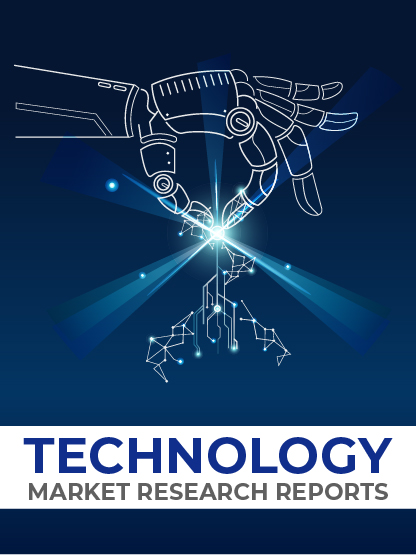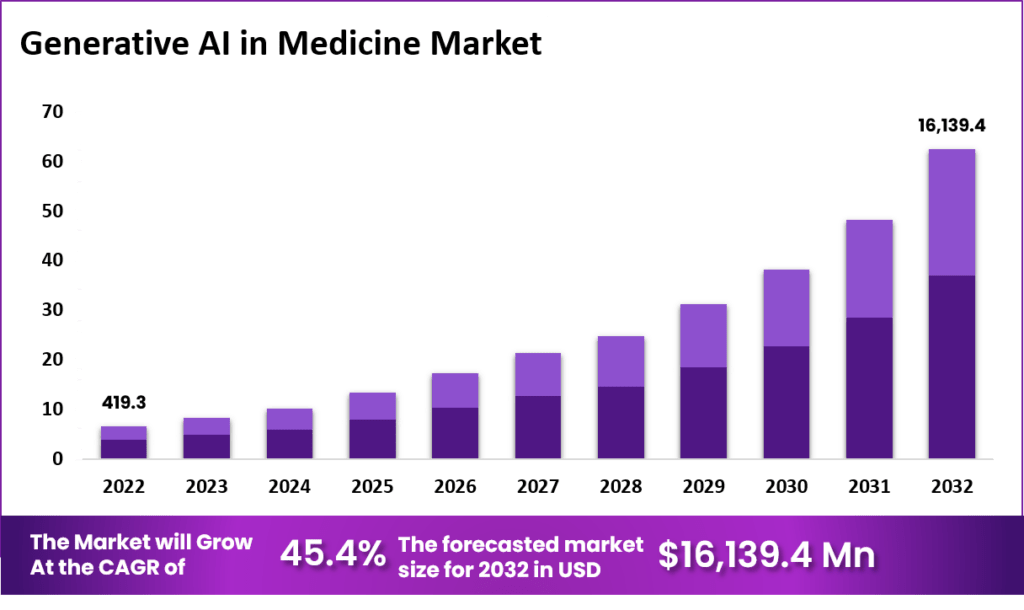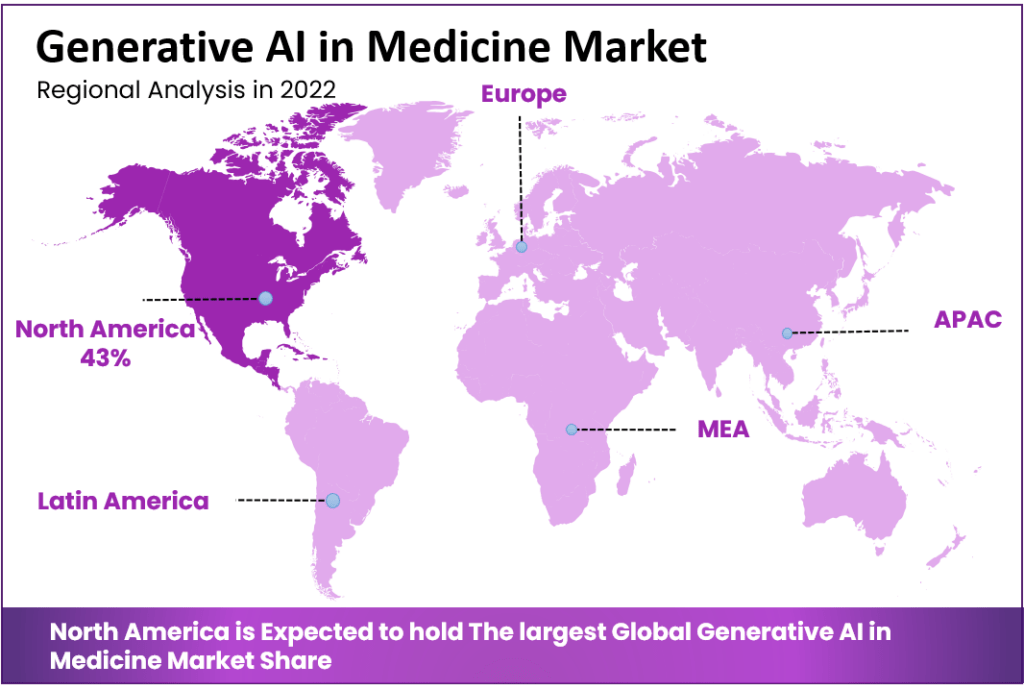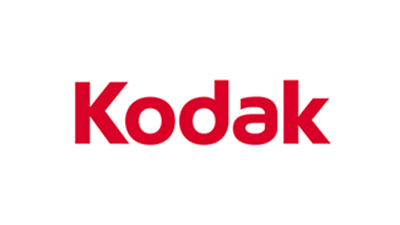
-
Report ID 138092 -
Published Date June 2023 -
Delivery Format PDF/PPT/Word -
Editor's Rating
-
Report Details
Market Size
The Generative AI in Medicine Market is estimated to expand significantly, with a projected worth of around USD 16,139.4 million by 2032. This represents a substantial growth rate, with a CAGR of 45.4% during the forecast period from 2023 to 2032, starting from a market value of USD 419.3 million in 2022.The market is being driven by the increasing demand for efficient medical diagnosis and treatment, the growing need for personalized medicine, and the technological advancements in generative AI.

Key Takeaways
- The market is expected to be dominated by the North American region, followed by Europe and Asia Pacific.
- The drug discovery segment is expected to be the largest market, followed by clinical trials, personalized medicines, and disease diagnosis.
- The market is expected to witness significant growth in the next few years due to the increasing adoption of generative AI in various medical applications.
Note – The number might vary in the actual report
Market Demand and Trend
The market for generative AI in medicine is being driven by the following factors:
- Growing demand for efficient medical diagnosis and treatment
- Increasing need for personalized medicine
- Technological advancements in generative AI
Largest Market and Fastest Growing Market
The largest market for generative AI in medicine is the North American region. This is due to the presence of a large number of pharmaceutical companies and research institutes in the region. The fastest-growing market is the Asia Pacific region. This is due to the rising healthcare expenditure and the increasing adoption of new technologies in the region.

Play a Larger Role in
Generative AI is expected to play a larger role in the following areas of medicine:
- Drug discovery
- Clinical trials
- Personalized medicine
- Disease diagnosis
Current Trends in the Market
The following are some of the current trends in the market for generative AI in medicine:
- Increasing adoption of generative AI in drug discovery
- Development of new generative AI algorithms for medical applications
- Increased collaboration between pharmaceutical companies and generative AI startups
5 Predictions about the Future
- Generative AI will be used to develop new drugs more quickly and efficiently.
- Generative AI will be used to personalize medicine for individual patients.
- Generative AI will be used to diagnose diseases more accurately and early.
- Generative AI will be used to develop new surgical techniques and procedures.
- Generative AI will be used to improve the quality of life for patients with chronic diseases.
Technological Advancements
The following are some of the technological advancements that are driving the growth of the market for generative AI in medicine:
- Development of new generative AI algorithms
- Increased availability of data
- Development of new hardware and software platforms
Increasing Demand in Developing Countries
The market for generative AI in medicine is expected to grow significantly in developing countries due to the following factors:
- Rising healthcare expenditure
- Increasing prevalence of chronic diseases
- Growing demand for personalized medicine
Market Dynamics
Drivers
The major drivers of the global generative AI in medicine market include:
- Growing demand for personalized medicine
- Increasing adoption of generative AI in drug discovery
- Technological advancements in generative AI
- Rising healthcare expenditure
Restraints
The major restraints of the global generative AI in medicine market include:
- Lack of skilled professionals
- High cost of generative AI solutions
- Regulatory challenges
Opportunities
The major opportunities for the global generative AI in medicine market include:
- Development of new generative AI algorithms
- Increasing adoption of generative AI in clinical trials
- Growing demand for personalized medicine in developing countries
Challenges
The major challenges for the global generative AI in medicine market include:
- Lack of awareness about generative AI
- High cost of data acquisition and processing
- Regulatory challenges
Key Players
- IBM Watson Health
- Microsoft Corporation
- Aidoc
- Insilico Medicine
- PathAI
- Butterfly Network
- Deep Genomics
- Google LLC
- Tencent Holdings Ltd.
- Neuralink Corporation
- Johnson & Johnson
- Other Key Players
Recent Developments
Some of the recent developments in the global generative AI in medicine market include:
- In 2022, Google AI announced the development of a new generative AI algorithm called Imagen. Imagen is capable of generating realistic images from text descriptions.
- In 2022, Nvidia announced the release of its new GPU, the Nvidia A100. The A100 is designed for AI workloads and is expected to accelerate the development of generative AI applications in medicine.
- In 2022, the FDA approved the first gene therapy drug, Zolgensma. Zolgensma is used to treat spinal muscular atrophy, a rare genetic disease. The development of Zolgensma was enabled by generative AI, which was used to design the drug’s gene sequence.
Market Segmentation
Based on Application
- Medical Imaging
- Drug Discovery
- Medical Diagnosis
- Patient Data Analysis
- Other Applications
Based on Deployment Model
- On-premise
- Cloud
Based on End-User
- Hospitals & Clinics
- Clinical Research
- Healthcare Organizations
- Diagnostic Centers
- Other End-Users
Key Regions
- North America
- The US
- Canada
- Mexico
- Western Europe
- Germany
- France
- The UK
- Spain
- Italy
- Portugal
- Ireland
- Austria
- Switzerland
- Benelux
- Nordic
- Rest of Western Europe
- Eastern Europe
- Russia
- Poland
- The Czech Republic
- Greece
- Rest of Eastern Europe
- APAC
- China
- Japan
- South Korea
- India
- Australia & New Zealand
- Indonesia
- Malaysia
- Philippines
- Singapore
- Thailand
- Vietnam
- Rest of APAC
- Latin America
- Brazil
- Colombia
- Chile
- Argentina
- Costa Rica
- Rest of Latin America
- Middle East & Africa
- Algeria
- Egypt
- Israel
- Kuwait
- Nigeria
- Saudi Arabia
- South Africa
- Turkey
- United Arab Emirates
- Rest of MEA
FAQs
1. What is generative AI?
Generative AI is a type of artificial intelligence (AI) that can create new data, such as images, text, or music. It does this by learning from existing data and then using that knowledge to generate new data that is similar to the original data.
2. How can generative AI be used in medicine?
Generative AI can be used in medicine in a variety of ways, including:
- Drug discovery: Generative AI can be used to generate new drug molecules that have the potential to treat diseases. This can help to speed up the drug discovery process and reduce the cost of developing new drugs.
- Personalized medicine: Generative AI can be used to create personalized treatment plans for patients. This can be done by analyzing a patient’s medical history, genetic information, and lifestyle factors to create a treatment plan that is tailored to the individual patient.
- Disease diagnosis: Generative AI can be used to develop new diagnostic tools that can help doctors to diagnose diseases more accurately and quickly. This can be done by using generative AI to create models of diseases that can be used to identify the presence of disease in patients.
- Patient care: Generative AI can be used to improve patient care in a variety of ways, such as by providing patients with more personalized information about their condition, helping them to manage their condition, and providing them with support and counseling.
3. What are the challenges of using generative AI in medicine?
There are a number of challenges associated with using generative AI in medicine, including:
- Data availability: Generative AI requires large amounts of data to learn from. This data can be difficult and expensive to obtain, especially for rare diseases.
- Data quality: The quality of the data used to train generative AI models is critical to the accuracy of the models. This data must be carefully curated to ensure that it is accurate and representative of the population that the model will be used to treat.
- Model validation: It is important to validate generative AI models to ensure that they are accurate and reliable. This can be done by comparing the predictions of the model to the ground truth data.
- Model interpretability: It is important to be able to understand how generative AI models work. This is important for ensuring that the models are making accurate predictions and for developing new treatments.
4. What is the future of generative AI in medicine?
Generative AI has the potential to revolutionize medicine by improving the speed, accuracy, and affordability of diagnosis and treatment. As the technology continues to develop, it is likely to be used in a wider range of applications in medicine.
-
Table Of Content
Research Insights & Deliverables
 Development and Future Forecast
Development and Future Forecast Competitive benchmarking
Competitive benchmarking Company Revenue Statistics
Company Revenue Statistics Rising Regional Opportunities
Rising Regional Opportunities Technology Trends and Dynamics
Technology Trends and Dynamics Technology Assessment
Technology Assessment
-
Inquiry Before Buying
Research Insights & Deliverables
 Development and Future Forecast
Development and Future Forecast Competitive benchmarking
Competitive benchmarking Company Revenue Statistics
Company Revenue Statistics Rising Regional Opportunities
Rising Regional Opportunities Technology Trends and Dynamics
Technology Trends and Dynamics Technology Assessment
Technology Assessment
-
Request Sample
Research Insights & Deliverables
 Development and Future Forecast
Development and Future Forecast Competitive benchmarking
Competitive benchmarking Company Revenue Statistics
Company Revenue Statistics Rising Regional Opportunities
Rising Regional Opportunities Technology Trends and Dynamics
Technology Trends and Dynamics Technology Assessment
Technology Assessment














